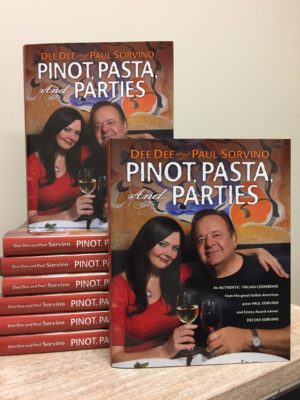 Paul Sorvino is a true Renaissance man. Best known for his acting in film and television, he also is an accomplished sculptor and opera singer, as well as a writer and businessman. And now, he is the author along with his wife Dee Dee of a new cookbook that may be the beginning of his re-emergence into the food industry.
Paul Sorvino is a true Renaissance man. Best known for his acting in film and television, he also is an accomplished sculptor and opera singer, as well as a writer and businessman. And now, he is the author along with his wife Dee Dee of a new cookbook that may be the beginning of his re-emergence into the food industry.
In Sorvino’s mind, it’s just another outlet for him as an artist and as an Italian American.
“Cooking is an art. The way we do it it’s an art. It’s an art and the results are almost immediate,” Sorvino says. “We celebrate life. As an Italian, cooking is life. Food is life. You get a chance to sit down at the table and talk with people about your day. It’s the way momma or papa or whoever is cooking expresses love and it’s the way whoever is eating receives the love. We Italians understand it, others still have not learned it and that’s why the Italian food craze swept America. Pizza and spaghetti with meatballs are American staples.”
The cookbook, “Pinot, Pasta and Parties” was the idea of Dee Dee Sorvino, an Emmy Award-winning political pundit and Paul’s wife of two years. According to Sorvino, Dee Dee’s came up with the idea in response to the many requests for recipes they would receive from dinner party guests.
“She said let’s do it and I said, ‘Ok, let’s do it,’” Sorvino says during a phone interview from his Los Angeles home.
This is not the first food-related venture for the 78-year-old Sorvino. He owned a restaurant in New York and also had a line of pasta sauces marketed as “Paul Sorvino’s Foods,” which will be re-launched soon. The book, described by Sorvino as “Pan-Italian,” features both general Italian recipes and Neapolitan recipes that he describes as authentic. Talking to Sorvino, who says he’s been cooking since he was 12-years-old, it doesn’t take long to realize that he is both knowledgeable and passionate about food and not just another celebrity who licensed his name for another cookbook.
“No, no. We wrote this book. We cooked here in our kitchen every day, sometimes 10 to 15 hours a day with a photographer here. We worked very hard on this book,” Sorvino says.
“What I think is extraordinary about this book, it’s the best Italian cookbook that I have seen and I’ll tell you why,” Sorvino says. “A lot of the Italian cookbooks that you’ll find are based on recipes that have been enhanced or changed and what you end up with is a hodgepodge of things that were once were authentic in Italy. My people are from two places in Italy, Molise and Naples, which for my taste, has the finest food in the world. Naples gave us all the American staples like Marinara sauce, Neapolitans invented this.
“Neapolitan food that you find in most restaurants today is not made in the original way. Time has a way of butchering everything. But the book is absolutely authentic from the way things were made 100 years ago.”
When Sorvino married Dee Dee, he says she was not very skilled in the kitchen but quickly absorbed knowledge from him.
“Before, when we made dinner, she would make reservations. She learned cooking from me. I wasn’t aware that she was doing it, but she just looks at something and understands it,” Sorvino says.
Dee Dee also contributed a craft cocktail recipe for each of the book’s ten chapters.
“Ten beautiful drinks and if you do drink any of them, you’ll need railings to hold onto when you walk away from the table,” Sorvino says, laughing.
Cooking is something Sorvino says he learned from his parents beginning at age 12 and the appreciation of food is something inherent with Italians and Italian Americans. He says he also taught his three adult children how to cook when they were kids: actors Mira and Michael Sorvino along with daughter Amanda Sorvino, who rescues horses for a living.
“There is no Italian that doesn’t love food. There is food that doesn’t love Italians, but there is no Italian that doesn’t love food,” Sorvino says, adding a caveat about the book. “Those who are on a diet might want to avoid this book. This is not diet food even though it is generally acknowledged by the latest science that the Mediterranean diet is the best for your heart and your health, but you have to watch your portions.”
Sorvino says while Dee Dee and he end up eating out a lot, they still cook at least one meal at home a day.
“I cook every day at home. We go out to restaurants three to four nights a week but all the other days, breakfast, lunch and diner is cooked right here,” Sorvino says. “Cooking is part of our everyday life. In a way we’d rather eat here because the food is almost always better. It’s certainly as good as and almost always better than restaurants that we would go to.”
He also says he won’t go somewhere that isn’t up to his standards, but that splitting time between New York and Los Angeles presents several great options for eating out.
“There are many great restaurants in New York, Le Cirque, so many good ones. In Los Angeles, there are some very good ones like Da Pasquale, or Marino Ristorante, one of the finest Neapolitan restaurants in the country. These are owned by Neapolitan families who moved here 30 or 40 years ago and kept everything intact, so everything they cook is exactly the way it was cooked in Naples.”
Authenticity essential to Sorvino and something that he says most cookbooks and restaurants continue to fail at.
“The ragù, or sauce — the way Neapolitans make it is very simple. But the way others make it is to put onions and garlic in it. Neapolitans never do that. Another one of the things the book teaches is what olive oil to use. What you fry with, what you sautè with and what you drizzle with is different. Everybody is using extra virgin olive oil, but you shouldn’t be cooking with that. It has a low smoking point, it gets bitter very quickly and then you’ll have to add sugar or onions to your recipe, but that’s wrong. You use regular olive oil and if you fry, you use light olive oil. These are things I teach in the book. Also, you should never use garlic and onions in the same dish. They cancel each other out.
“With cooking, you should not be able to taste the condiments,” Sorvino goes on to say. “If you have a marinara sauce which is a garlic based sauce, you should not be able to taste the garlic. That means you added too much garlic. You should just be able to taste the sauce.”
Sorvino says most Italian cooking isn’t so hard but is often made to seem hard, scaring some people from trying to cook.
“Most people complicate Italian food so much that you don’t even want to have it anymore. One of great things about Neapolitan food is that it’s extremely simple. The sailors in the Bay of Naples 100 years ago would have to make a lunch so they took some olive oil and tomatoes with them on the ocean. They’d take their catch and add it to the simple sauce that became known as marinara sauce. Marinara means sailor in Italian. The marinara sauce was invented by sailors.”
People just starting out cooking should not be afraid to fail, he says. “I knew how to cook really well by the time I was 15 but really improved over the years. The meatballs I make are my mother’s recipe and I show how in the book. I started making them when I was 30 but they didn’t come out great. It took me 10 months and about 12 tries to make them right. Why? Because the recipe is not the only answer. You have to get the feel of making them. That’s a particular thing. If you follow exactly what I say it may not come out well. The meatballs took me a long time and I was a pretty darn good cook by the time I started. So you just have to try again. You don’t learn from your successes. You learn from your failures.”
Another common food crime is overloading ingredients, according to Sorvino.
“If you are making primavara pomodoro which is essentially a marinara sauce made with onions but not garlic, you should not be tasting the onions. If you put oregano into a dish, you should not be tasting the oregano, it kills it completely. Most Italian restaurants throw in so much oregano that you can’t eat the dish. There’s a lot of things like that which I’m very autocratic about and I make no apologies for my dictatorial take on it,” Sorvino says.
Sorvino says another big mistake restaurants make is with simple dishes like pasta e fagioli.
“Pasta e fagioli is a simple dish. This dish is made with regular olive oil, pinched garlic, cannellini beans, and some tomato sauce or tomatoes that you put in it. A lot of restaurants serve it as a soup, that’s not what I’m talking about. I’m talking about the real Neapolitan pasta e fagioli. When I had my restaurant I had to teach the chef how to make it the real Neapolitan way. Then someone would order it and then ask the waiter for cheese. The waiter was instructed by us to say, ‘Sir, Mr. Sorvino does not allow us to bring cheese to the table for this dish. If you want it, it’s right over there on the table but if I bring it to you I’ll be fired on the spot.’ Cheese completely destroys pasta e fagioli.
Looking ahead, Sorvino says his wife and he have already been asked to do another cookbook; are planning to re-launch Sorvino Foods, this time adding wine and pizza to the selection of sauces; and are considering doing a cooking show.
“We are going to be adding wines and we are developing a way to make pizza on a national scale so that it retains its flavor and freshness. That’s a challenge for us and we’re hoping to have that out in six months to a year. As for a cooking show, we have been approached about it and we’d consider it if it’s done the right way. It has to be something that makes sense for Dee Dee and me to do.”
 Fra Noi Embrace Your Inner Italian
Fra Noi Embrace Your Inner Italian





